Are you tired of the endless paperwork, frustrating delays, and lack of transparency in traditional real estate transactions? If your answer is no, then you must be hiding a solution that will end all of our problems once and for all. Please share it with us!
Whether you’re a real estate professional or an investor, smart contracts offer a transformative solution. These self-executing digital agreements, powered by blockchain technology, are not just a futuristic concept they’re already reshaping how we buy, sell, lease, and manage property. According to a 2024 study, smart contracts have reduced transaction times by up to 70% in some real estate markets. By automating processes, enhancing trust, and reducing costs, smart contracts are creating a more efficient and secure real estate industry. Discover how this groundbreaking technology can revolutionize your property transactions today.
This guide provides a comprehensive overview of smart contracts in real estate, detailing their mechanics, benefits, real-world applications, and essential considerations for successful implementation. We will explore how these self-executing digital agreements, powered by blockchain technology, can transform the real estate industry by making transactions more transparent, secure, and efficient. This article will equip you with the knowledge to understand and leverage this innovative technology.
Smart Contract Mechanics: Real Estate Transformation
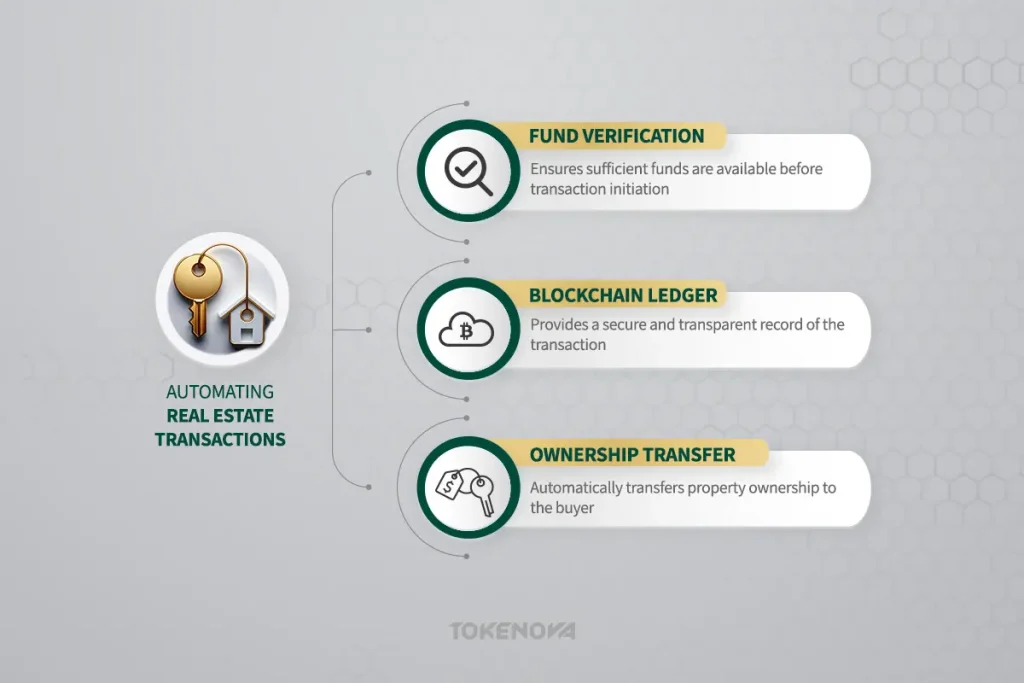
To fully appreciate the transformative power of smart contracts in real estate, it’s crucial to understand how they work. Imagine a world where property transactions are executed with precision, eliminating manual processes and reducing the risk of human error. Smart contracts make this possible by automating every step of the transaction, from verifying funds to transferring ownership. For example, in 2023, a blockchain-based smart contract platform in Dubai successfully facilitated a $2.5 million property sale without intermediaries. This isn’t just a concept it’s a practical solution that’s already streamlining real estate deals worldwide.
Transaction Automation: Seamless Property Deals
At its core, a smart contract for real estate is a self-executing agreement with terms written directly into code. Think of it as a digital escrow agent that automatically enforces the rules of the transaction. Once predefined conditions like verifying the buyer’s funds and confirming a clear property title are met, the contract executes the agreed-upon actions without any manual intervention.
Blockchain technology ensures the security and immutability of these contracts, making them tamper-proof and transparent. Recent advancements, such as the integration of zero-knowledge proofs, have further enhanced the privacy and efficiency of smart contracts. This automation not only speeds up the process but also reduces the risk of errors and fraud, fundamentally changing how real estate transactions are conducted.
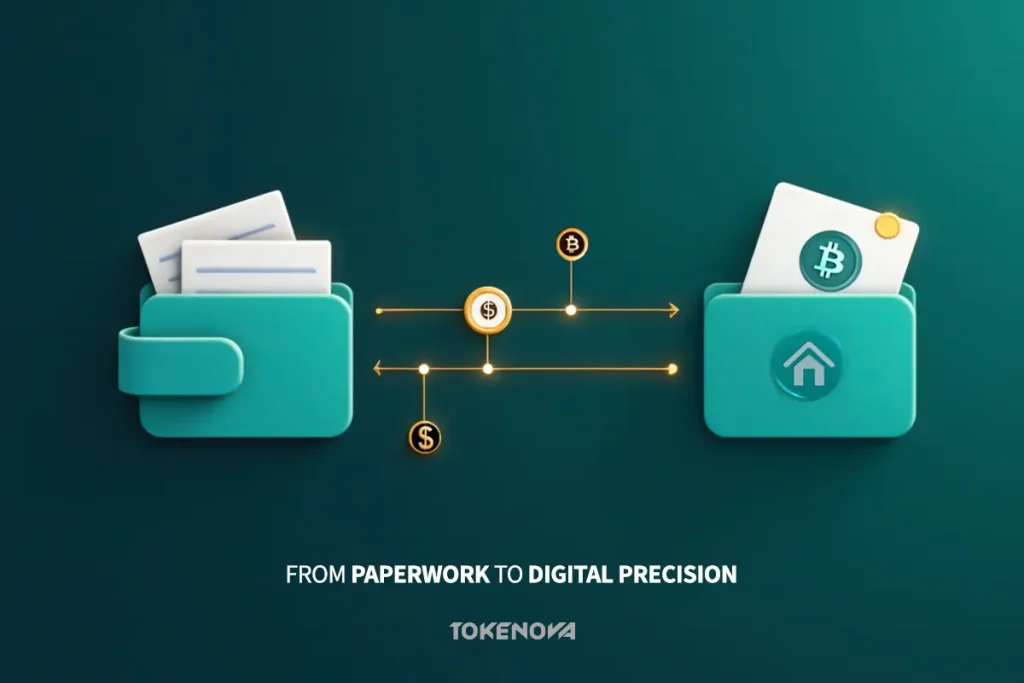
Property transaction smart contracts can streamline property sales by automating the entire process. Instead of relying on lawyers, notaries, and escrow agents, a smart contract ensures that once the buyer’s funds are securely deposited and the digital title deed is verified, the ownership transfer to the buyer’s digital wallet occurs while simultaneously releasing funds to the seller. This reduces delays, minimizes fraud risks, and enhances reliability.
In addition, smart contracts can automate rental agreements, enabling automatic rent transfers and late fee applications. They can also simplify lease renewals based on predefined conditions. By utilizing blockchain’s immutable nature, the often complex title transfer process becomes faster and more secure. Overall, smart contracts offer a transformative approach to property transactions, making them more efficient and less stressful.
Verification & Execution: Trust via Blockchain
The seamless automation of smart contracts is powered by blockchain technology, which acts as a decentralized, immutable ledger. This ensures a level of transparency and security that traditional systems cannot match. For example, in 2024, a blockchain-based land registry system in Sweden successfully verified and executed over 10,000 property transactions without a single error. Here’s how the verification and execution process works:

Before a property transaction proceeds, smart contracts utilize blockchain to verify crucial information automatically. For example, they can instantly confirm that the buyer’s funds are available in their digital wallet through cryptographic verification, providing immediate assurance to the seller and eliminating delays associated with traditional banking. Additionally, integrating land registry data into the blockchain allows for the validation of property titles, creating a tamper-proof ownership record that reduces the risk of disputes and the need for lengthy title searches.
Once all conditions in the smart contracts are met, the contract executes actions automatically and irreversibly, without manual intervention. This eliminates the need for intermediaries, lowering costs and minimizing potential failures. By leveraging the transparency and security of blockchain technology, real estate transactions can achieve unprecedented trust and efficiency rooted in cryptographic security rather than reliance on a central authority.
Post-Transaction Efficiency: Beyond Closing
From updating property records to managing escrow, smart contracts handle tasks that typically involve manual effort, saving time and reducing the risk of errors. For example, in 2023, a smart contract platform in the U.S. automated the entire post-closing process for a $1.2 million property sale, reducing the time required from weeks to just 48 hours. This makes property management more efficient and reliable.

Consider the often-cumbersome process of updating property records. With real estate smart contracts, upon the successful completion of a property sale, the smart contract can automatically trigger an update to the relevant land registry records on the blockchain. This ensures that property ownership information is always accurate, up-to-date, and readily verifiable, eliminating the delays and potential errors associated with manual record-keeping.
Think of the administrative burden this alleviates for government agencies and the increased accuracy it provides to the public record. Furthermore, certain compliance checks, which are often time-consuming and resource-intensive, can be automated through property transaction smart contracts. For example, verifying that all parties involved in a transaction hold the necessary licenses or ensuring adherence to local zoning regulations can be programmed into the smart contract, automatically halting the transaction if any compliance requirements are not met.
This proactive approach to compliance reduces administrative burdens and minimizes the risk of legal issues down the line. This automation not only saves time and resources but also ensures a higher level of compliance and reduces the potential for costly legal battles.
Moreover, blockchain real estate contracts can revolutionize escrow management. Instead of relying on traditional escrow agents, smart contracts can act as automated and impartial custodians of funds. The funds are securely held within the smart contract until all the pre-agreed conditions of the agreement are fulfilled. Once these conditions are met and verified on the blockchain, the smart contract automatically releases the funds to the appropriate party.
This automated escrow process enhances transparency, reduces the risk of misappropriation of funds, and eliminates the fees associated with traditional escrow services. The ability of smart contract for real estate to streamline these post-transaction processes contributes significantly to the overall efficiency and cost-effectiveness of property management and ownership. This level of automation and security in escrow management provides significant benefits to both buyers and sellers, reducing risk and increasing trust in the transaction.
Crafting Your Smart Contract Strategy: A Narrative Approach
Imagine you’re building a house. You wouldn’t start without a blueprint, right? Similarly, implementing smart contracts requires a strategic approach. First, identify the “leaky faucets” in your current real estate processes – the areas where inefficiencies and costs are draining your resources. Perhaps it’s the lengthy closing process or the cumbersome management of rental agreements. Start by piloting smart contracts in these specific areas, like testing a new plumbing fixture before installing it throughout the house. Focus on creating a user-friendly experience, making sure everyone, from your team to your clients, understands how to interact with these new digital tools. Think of it as providing clear instructions for using each new appliance in your smart home.
Smart Contract Benefits: Real Estate Advantages
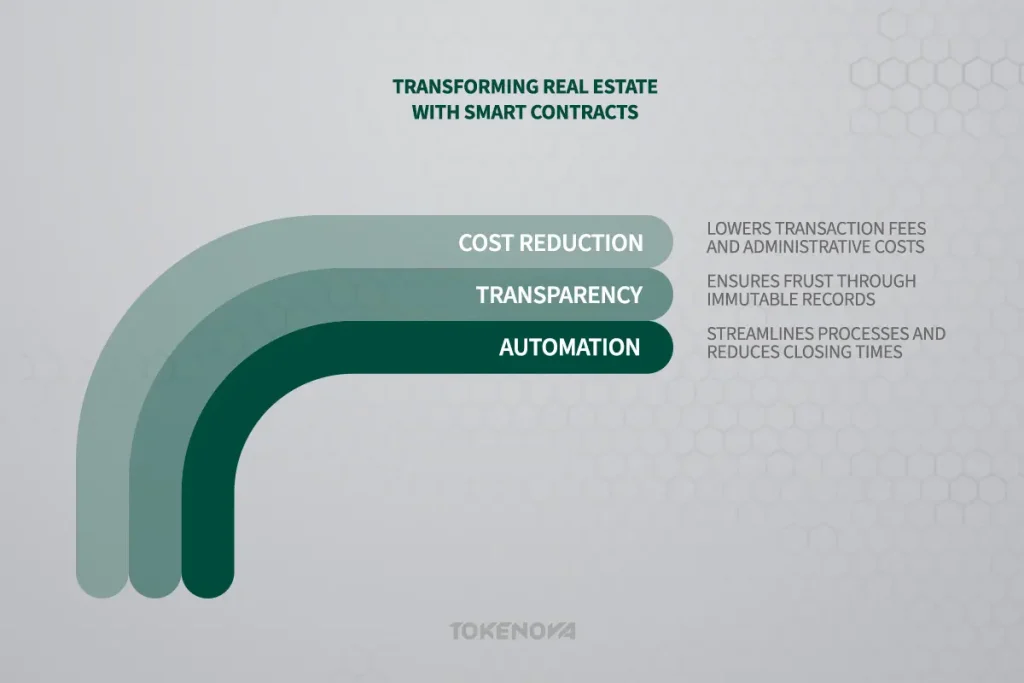
Smart contracts are transforming the real estate industry by addressing many of its most persistent challenges. According to a 2024 report, smart contracts have reduced transaction costs by up to 40% in some markets. By automating processes, increasing transparency, and reducing costs, smart contracts are creating a more efficient and trustworthy system for property transactions. Here are the key benefits they offer:
Automation: Accelerating Real Estate Processes
As previously discussed, the inherent automation capabilities of real estate smart contracts are a game-changer. By automating key processes that traditionally require manual intervention, smart contracts significantly reduce the time, effort, and resources involved in real estate transactions. This translates into tangible benefits for all parties involved.
Imagine the impact on closing times. The elimination of manual paperwork, the need for multiple intermediaries, and the potential for human error can drastically shorten the closing process for property transaction smart contracts. What once took weeks or even months can potentially be reduced to days or even hours, benefiting both buyers eager to move in and sellers looking to finalize the sale quickly. This speed is not just a convenience; it can have significant financial implications, reducing holding costs for sellers and allowing buyers to access their new property sooner.
Furthermore, the digital nature of blockchain real estate contracts significantly reduces the reliance on paper-based documentation. This not only contributes to a more sustainable and environmentally friendly approach but also reduces the costs associated with printing, storing, and managing physical documents. The reduction in manual processes also minimizes the risk of human error, leading to more accurate and reliable transactions, reducing the potential for costly mistakes and disputes. This accuracy translates to fewer legal challenges and a smoother overall transaction experience.
Transparency: Building Real Estate Trust
The unparalleled transparency offered by blockchain-based smart contract for real estate is a critical factor in building trust and confidence within the industry. This transparency addresses concerns about opacity and information asymmetry that have historically plagued real estate transactions.
Every transaction and condition embedded within a real estate smart contract is immutably recorded on the blockchain, creating an auditable and tamper-proof record. This means that all actions and agreements are permanently documented and cannot be altered retroactively, providing a single source of truth for all parties involved. This eliminates the possibility of one party unilaterally changing the terms of the agreement or disputing what was agreed upon.
Moreover, all authorized participants in the transaction have access to the terms and conditions of the property transaction smart contracts, fostering transparency and significantly reducing the potential for misunderstandings or disputes arising from conflicting interpretations of the agreement. This increased visibility and the immutable nature of the blockchain can help prevent disputes by providing a clear and verifiable record of all transaction details, fostering a more trustworthy and reliable environment for real estate dealings. This transparency builds confidence and reduces the need for extensive due diligence, as the terms of the agreement are readily accessible and verifiable.
Cost Reduction: Optimizing Real Estate Expenses
The efficiencies and automation inherent in smart contracts for real estate directly translate into significant cost savings across various aspects of property transactions. This cost reduction is a major driver for the adoption of this technology.
By automating processes and eliminating the need for certain intermediaries, such as brokers, escrow agents, and notaries in specific aspects of the transaction, blockchain real estate contracts can significantly reduce transaction fees. These savings can be substantial, particularly for high-value transactions. These savings can be reinvested in other areas of the business or passed on to consumers, making real estate transactions more affordable. Furthermore, automating manual processes reduces the administrative burden associated with traditional real estate transactions.
This translates to lower labor costs, reduced paperwork expenses, and a more efficient allocation of resources. The clarity and transparency of smart contract for real estate can also potentially reduce the need for extensive legal review and intervention. The clearly defined terms and automated execution minimize the potential for disputes, thereby reducing legal fees associated with resolving conflicts. This cost reduction makes real estate transactions more efficient and accessible.
Unlocking Financial Efficiency: The Smart Contract Promise
Think of smart contracts as a financial Swiss Army knife for real estate. They streamline processes, eliminate unnecessary intermediaries, and reduce the potential for costly errors. This translates directly to significant savings on transaction fees, administrative overhead, and legal expenses. By embracing this technology, you’re not just adopting a new tool; you’re unlocking a pathway to greater financial efficiency and profitability in your real estate endeavors.
Smart Contract Use Cases: Real Estate in Action
The potential of smart contracts for real estate is no longer theoretical; it’s being realized through a growing number of real-world applications that are transforming how property is bought, sold, and managed.

Fractional Ownership: Democratizing Real Estate
Smart contract for real estate are revolutionizing property investment by enabling fractional ownership through tokenization. This innovative approach divides ownership of a property into digital tokens, making it accessible to a wider range of investors who may not have the capital for a full property purchase. These tokens, representing a fraction of the property’s value, can be easily bought, sold, and traded on secondary markets, providing liquidity and flexibility previously unavailable in traditional real estate investment. Blockchain real estate contracts manage the ownership rights and distribution of rental income or profits based on the number of tokens held by each investor, automating the entire process and ensuring transparency. This opens up new avenues for both investors and developers, allowing for greater participation in the real estate market.
Decentralized Management: Transparent Operations
Smart contracts in real estate are increasingly being used for decentralized property management. These contracts can automate various property management tasks, such as rent collection, maintenance requests, and lease renewals, creating a more efficient and transparent system for both landlords and tenants.
For instance, rent payments can be automatically collected on scheduled dates, while maintenance requests can be logged and tracked through the smart contract, triggering automatic notifications to the relevant parties. Additionally, lease renewals can be automated based on predefined conditions, streamlining the process and reducing administrative workload.
This decentralized approach enhances transparency and minimizes the need for intermediaries in everyday property management. Consequently, it fosters a more direct and efficient relationship between landlords and tenants, thereby reducing the chances of miscommunication and disputes..
Automated Escrow: Secure Fund Handling
As previously mentioned, property transaction smart contracts can act as automated escrow agents, securely holding funds and releasing them automatically upon the fulfillment of contract conditions. This eliminates the need for traditional escrow companies, reducing fees and increasing efficiency. The conditions for fund release are clearly defined in the smart contract code, ensuring transparency and preventing the possibility of funds being released prematurely or withheld unfairly. This automated escrow process provides a higher level of security and trust for all parties involved in the transaction. This increased security and efficiency in escrow management is a significant advantage for both buyers and sellers.
Streamlined Rentals: Simplifying Leasing
Smart contract for real estate can significantly simplify the rental process for both landlords and tenants. Automated lease agreements can be created and executed through smart contracts, outlining the terms and conditions of the rental agreement in a transparent and immutable manner. Rent payments can be automated, and security deposits can be held securely within the smart contract and automatically returned to the tenant upon the satisfactory completion of the lease term. This streamlined process reduces paperwork, minimizes disputes, and creates a more efficient and transparent rental experience. This automation and transparency can lead to a more positive and efficient rental experience for both parties.
Secure Transfers: Enhancing Property Security
By integrating with blockchain-based land registries, smart contract for real estate can facilitate secure and efficient title transfers, significantly reducing the risk of fraud and title disputes. The immutability of the blockchain ensures that property ownership records are tamper-proof, and the automated execution of smart contracts ensures that title transfers are carried out accurately and efficiently upon the fulfillment of all necessary conditions. This enhanced security and efficiency can save time and money for both buyers and sellers and increase confidence in the integrity of property ownership records. This increased security and efficiency in title transfers is a fundamental benefit of using smart contracts in real estate.
Read More: The Advantages of Blockchain Smart Contracts
Witnessing the Transformation: Smart Contracts in Action
Imagine a world where buying or selling property is as seamless as transferring funds online. This isn’t a far-off fantasy; it’s the reality being built with smart contracts. From fractional ownership platforms that democratize investment to automated rental agreements that simplify property management, the practical applications of this technology are rapidly expanding, transforming the way we interact with real estate.
Smart Contract Challenges: Real Estate Considerations
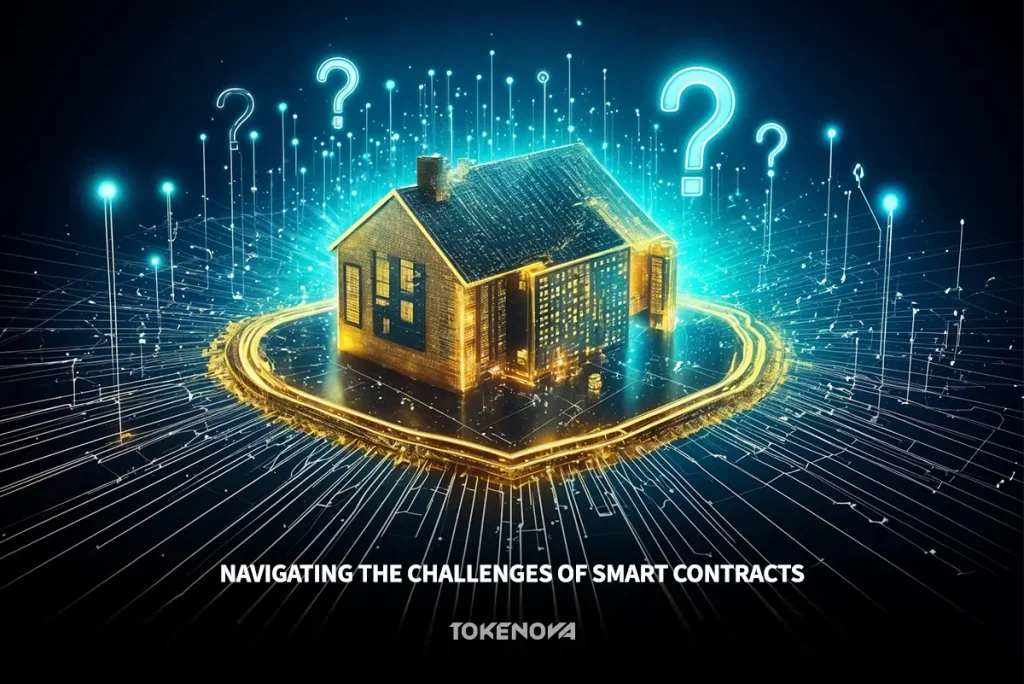
While smart contracts hold immense potential for real estate, their successful implementation faces significant challenges. For example, in 2024, a smart contract platform in the EU faced regulatory hurdles due to conflicting data privacy laws. From regulatory uncertainty to technical complexity, here are the key considerations to keep in mind:
Regulatory Uncertainty: Navigating Legalities
The enforceability of blockchain real estate contracts is a primary concern. Ensuring that smart contracts are legally recognized as binding agreements and enforceable in different jurisdictions is crucial for widespread adoption. The legal framework needs to adapt to the unique characteristics of smart contracts, particularly their self-executing nature and the immutability of the blockchain. Furthermore, questions surrounding data privacy and security within the context of blockchain-based transactions need to be addressed.
Regulations need to be developed to ensure compliance with data protection laws while leveraging the transparency and security of blockchain technology. Finally, clear guidelines are needed regarding the tax implications of transactions executed through property transaction smart contracts. Determining how existing tax laws apply to these new forms of digital agreements is essential for providing clarity and certainty for users.
💡Smart Contract, Smart Tip: The legal and regulatory landscape surrounding smart contracts for real estate is still evolving, creating a degree of uncertainty for businesses and individuals looking to adopt this technology. Clarity is needed on several key issues.
Technical Complexity: Bridging Knowledge Gaps
Developing secure and reliable real estate smart contracts requires skilled developers with expertise in blockchain technology and smart contract programming languages. Furthermore, thorough auditing processes are essential to identify and address any potential vulnerabilities in the smart contract code before deployment. Ensuring interoperability between different blockchain platforms and existing real estate systems is also a significant technical challenge.
Seamless integration is crucial for widespread adoption and requires the development of standards and protocols that allow different systems to communicate effectively. Finally, user adoption is heavily reliant on making the technology accessible and user-friendly. Developing intuitive interfaces and providing adequate educational resources are essential for bridging the knowledge gap and encouraging wider adoption of smart contracts for real estate.
💡Smart Contract, Smart Tip: Understanding, developing, and implementing smart contracts for real estate requires a certain level of technical expertise, which can be a barrier to entry for some.
Read More: Choose the Best Blockchain for Smart Contracts
Resistance to Change: Overcoming Tradition
Convincing traditional stakeholders, such as brokers, lawyers, and title companies, of the benefits of blockchain real estate contracts is essential. Highlighting the potential for increased efficiency, reduced costs, and enhanced transparency can help overcome skepticism and encourage collaboration. A lack of awareness about the potential of smart contracts for real estate is another significant hurdle.
Educating individuals and businesses within the real estate sector about the benefits and practical applications of this technology is crucial for driving adoption. Finally, building trust in this relatively new technology is essential for overcoming skepticism and encouraging adoption. Demonstrating the security, reliability, and transparency of property transaction smart contracts through successful pilot programs and real-world examples can help build confidence and encourage wider acceptance.
💡Smart Contract, Smart Tip: The real estate industry, like many established sectors, is often characterized by traditional practices and a degree of resistance to change. Overcoming this inertia is crucial for the widespread adoption of smart contracts for real estate.
Legal Aspects: Smart Contracts in Property
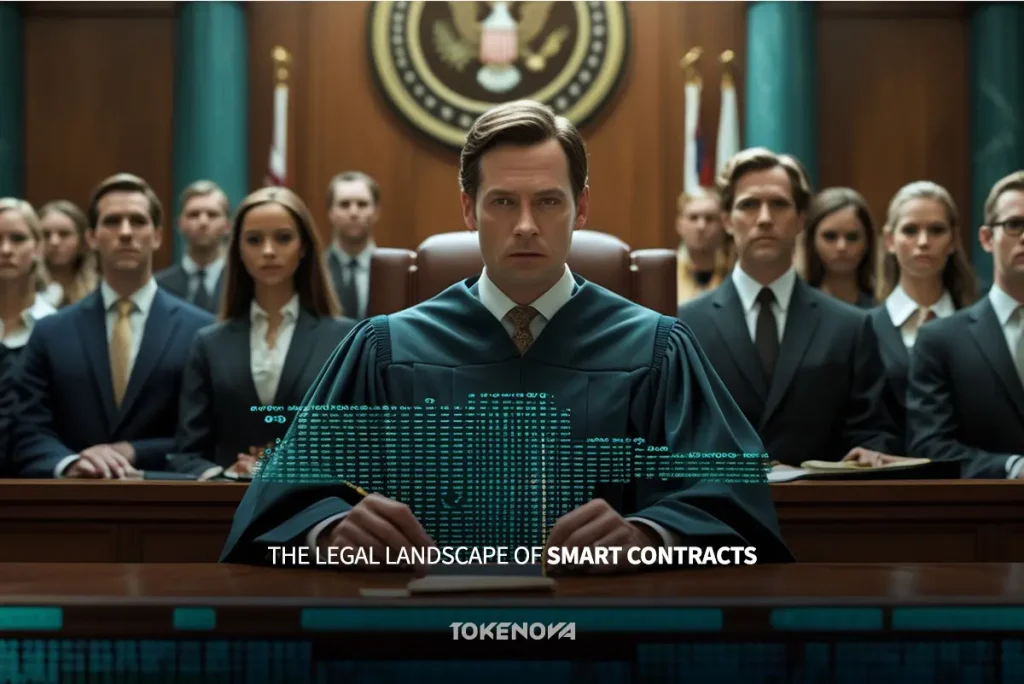
The legal implications of utilizing smart contract for real estate in property transactions are a paramount consideration. While the technology offers numerous advantages, navigating the existing legal framework and anticipating future developments is crucial.
Enforceability & Jurisdiction: Key Legalities
Are smart contracts for real estate legally recognized as binding agreements within the relevant legal jurisdictions? The legal status of smart contracts is still being defined in many parts of the world, and clarity on their legal recognition is essential for their widespread adoption. In the event of a dispute arising from a property transaction smart contract executed on a decentralized blockchain, determining which jurisdiction’s laws will apply can be complex.
The decentralized nature of blockchain technology makes it challenging to pinpoint a specific jurisdiction, and legal frameworks need to adapt to address this issue. Furthermore, how will courts interpret the code of a real estate smart contract in the event of a disagreement? The technical nature of smart contract code may require legal professionals to develop new approaches to interpretation and dispute resolution.
💡Smart Contract, Smart Tip: One of the fundamental legal considerations surrounding blockchain real estate contracts is their enforceability. Several key questions arise in this context.
Smart Contracts & Law: Finding Compatibility
How do traditional contract law principles, such as offer, acceptance, and consideration, apply to the self-executing code of blockchain real estate contracts? Legal frameworks need to adapt to accommodate the unique characteristics of smart contracts while ensuring that fundamental contract law principles are upheld. Furthermore, how do smart contract for real estate interact with existing property laws and regulations regarding ownership, transfer, and encumbrances?
Ensuring compatibility between smart contract technology and established property law is crucial for seamless integration. Finally, how can consumer protection be ensured in transactions executed through property transaction smart contracts? Regulations need to be developed to protect consumers from potential risks associated with this new technology, such as code vulnerabilities or lack of transparency in certain aspects of the contract.
💡Smart Contract, Smart Tip: Integrating smart contract for real estate into existing legal frameworks requires careful consideration of how these digital agreements interact with established legal principles.
Legal Professionals: Adapting to Tech
Reviewing and auditing the code of blockchain real estate contracts to ensure that it accurately reflects the intended legal agreement and is free from vulnerabilities. This requires legal professionals to develop a new skillset and collaborate with technical experts. Legal professionals are also playing a crucial role in developing legal frameworks and best practices for the use of smart contracts for real estate. Their expertise is essential for providing clarity and certainty in this evolving legal landscape. Finally, lawyers are advising clients on navigating the complex and evolving regulatory landscape surrounding smart contracts for real estate, ensuring compliance, and mitigating potential legal risks.
💡Smart Contract, Smart Tip: The advent of smart contracts for real estate is transforming the role of legal professionals in property transactions. Instead of solely focusing on drafting traditional paper-based contracts, lawyers are increasingly involved in.
Navigating the Legal Maze: A Collaborative Approach
Think of legal professionals as your guides in this new technological landscape. Their expertise is crucial for ensuring that your smart contract initiatives are legally sound and compliant. Collaboration between legal and technical experts is key to navigating the evolving legal framework and mitigating potential risks.
Future Outlook: Real Estate’s Smart Revolution
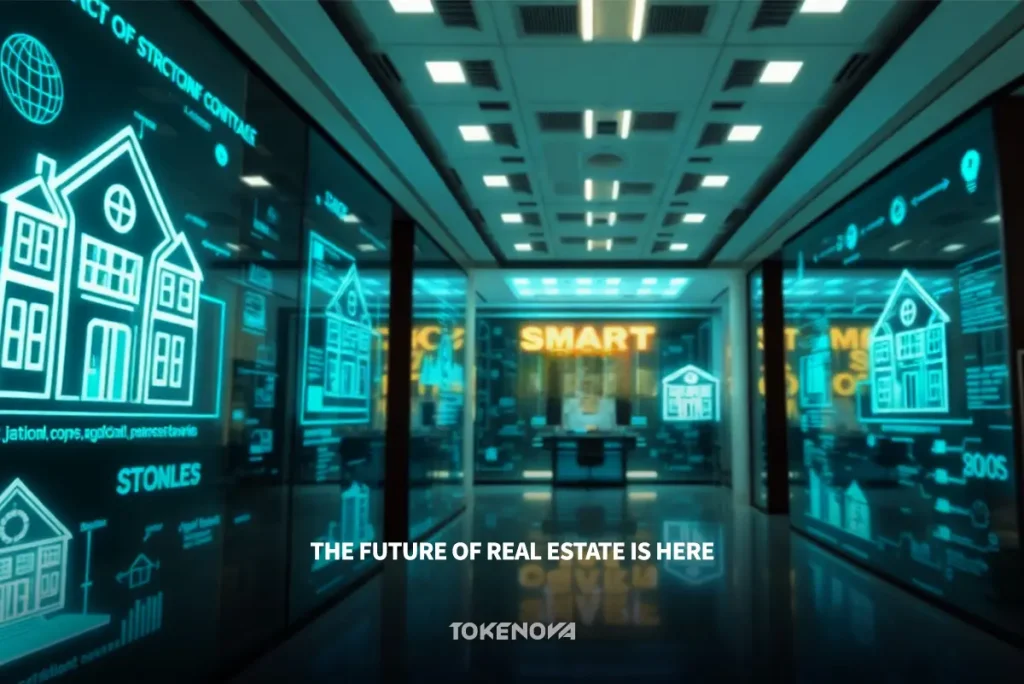
The future of smart contracts in real estate is bright, with ongoing innovations and increasing adoption across the industry. According to a 2024 report, the global smart contract market in real estate is expected to grow by 25% annually over the next five years. As technology evolves and regulatory frameworks mature, smart contracts are set to become a standard tool for property transactions, offering even greater efficiency and security.
Increased Adoption: Becoming Mainstream
As the technology matures, regulatory clarity increases and awareness grows, we can anticipate increased adoption of smart contracts for real estate across various facets of the industry.
We are likely to see the wider use of blockchain real estate contracts in standard property sales and rental transactions, streamlining the process and reducing costs for both buyers and sellers. Furthermore, we can expect to see the integration of smart contract for real estate functionality into existing real estate platforms and software, making the technology more accessible and user-friendly for a wider audience. Governments around the world may increasingly explore the use of blockchain and smart contract for real estate for land registry and other public record management, enhancing transparency and efficiency in public services.
Technological Growth: Pushing Boundaries
Ongoing technological advancements will further enhance the capabilities and applications of smart contracts for real estate.
Improvements in blockchain technology will lead to more secure and scalable platforms for property transaction smart contracts, addressing concerns about security and the ability to handle a large volume of transactions. Efforts to improve interoperability between different blockchain networks will facilitate wider adoption and seamless integration of smart contracts for real estate across various platforms and systems. The integration of smart contracts for real estate with other emerging technologies, such as artificial intelligence (AI) and the Internet of Things (IoT), can unlock new possibilities for automated property management, smart buildings, and more efficient real estate operations.
Tokenova: Your Gateway to Real Estate Innovation
At Tokenova, we are at the forefront of this exciting transformation, providing expert services in real estate tokenization and smart contract development. We empower businesses and individuals to harness the power of blockchain and smart contracts for real estate to unlock new opportunities in the real estate market. Want to learn how tokenization can work for you? Let’s talk—contact our specialists today!
Developing tailored real estate tokenization strategies and implementing secure and compliant token offerings to facilitate fractional ownership and access to capital. Creating robust and secure smart contracts for real estate for a wide range of applications, from property sales and rentals to escrow services and property management. Building and integrating blockchain-based platforms that enable seamless and efficient property transaction smart contracts.
Conclusion
Smart contracts are no longer a futuristic idea they’re a reality transforming the real estate industry. By automating transactions, increasing transparency, and reducing costs, smart contracts offer undeniable benefits. While challenges like regulatory uncertainty and technical complexity remain, the trend is clear: adoption is growing, and the potential is immense. Now is the time to embrace this technology and unlock a more efficient, secure, and transparent future for real estate.
Key Takeaways
- Smart contracts for real estate automate key processes like sales, rentals, and title transfers, increasing efficiency.
- Blockchain technology provides the foundation for secure and transparent property transaction smart contracts.
- Benefits include reduced costs, increased transparency, and faster transaction times for blockchain real estate contracts.
- Use cases range from fractional ownership and automated property management to secure title transfers.
- Addressing regulatory uncertainty and technical complexity is crucial for wider adoption of smart contracts for real estate.
- The future holds significant potential for further innovation and integration of real estate smart contracts.
What measures are in place to ensure the accuracy and security of the code in real estate smart contracts?
Ensuring the accuracy and security of smart contract code is paramount. This involves rigorous code audits conducted by independent security experts who meticulously review the code for potential vulnerabilities and bugs. Formal verification methods, which use mathematical proofs to verify the correctness of the code, are also increasingly being employed. Furthermore, best practices in smart contract development, such as writing modular and well-documented code, contribute to improved security and maintainability. The immutability of the blockchain also provides a degree of security, as once a smart contract is deployed, its code cannot be altered.
How can traditional real estate businesses begin to integrate smart contracts into their existing operations?
Traditional real estate businesses can begin integrating smart contracts by starting with pilot projects focused on specific areas, such as automating rental agreements or managing property access. Partnering with blockchain development companies or consultants with expertise in smart contracts can provide valuable guidance and technical support. Investing in training and education for staff to understand the fundamentals of smart contracts and blockchain technology is also crucial. Gradually integrating smart contract functionalities into existing workflows and systems, rather than attempting a complete overhaul, is a more manageable approach.
What is the role of “oracles” in the functionality of smart contracts for real estate?
Oracles play a crucial role in bringing external, real-world data onto the blockchain to be used by smart contracts. In the context of real estate, oracles can provide data such as property valuations, weather conditions for insurance purposes, or even confirmation of physical events like property inspections. This external data triggers the execution of the smart contract based on predefined conditions. For example, a smart contract for property insurance might use an oracle to verify weather data before automatically processing a claim. The reliability and security of oracles are critical, as inaccurate or compromised data can lead to incorrect execution of the smart contract.











